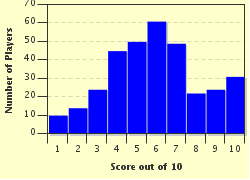Quiz Answer Key and Fun Facts
1. "The foreign reader...is at once struck by two features: in the first place its unity in complexity; and, in the second, its constant efforts to impress on its hearers the idea of a single centralized India, with a heroic tradition of her own as formative and uniting impulse." Who wrote this about the Mahabharata?
2. Friedrich Wilhelm Christian Karl Ferdinand Freiherr von Humboldt, the architect of the Prussian education system, and founder of Humboldt University in Berlin, said this of which part of the Mahabharata: "the most beautiful, perhaps the only true philosophical song existing in any known tongue"?
3. According to Wikipedia, "with about one hundred thousand verses, long prose passages, or about 1.8 million words in total, the Mahabharata" (or the Satasahasri Samhita) "is roughly ten times the length of the Iliad and Odyssey combined, or about four times the length of the Ramayana", and over three times as long as the Bible.
According to the Mahabharata itself, the tale is extended from a shorter version of 24,000 verses, which in turn has been extended from an even shorter version consisting of only 8800 verses and called 'Jaya', or the collection dealing with 'victory'.
What is the middle version, forming the core of the Mahabharata, called?
4. Webster's New World College Dictionary, Fourth Edition, defines 'bastard' as a person born of parents not married to each other. Which of these characters of the Mahabharata was NOT a bastard according to the story?
5. Who among these had exactly one wife?
6. Which one of these married his first cousin?
7. There are hundreds of characters in Mahabharata, but we hear only about a select few. For instance who knows of all the 29 sons of Duryodhana, or of the various wives of Arjuna?
Which unusual novel, based on the Mahabharata, by Devdutt Pattanaik, and published by Penguins Book India, tells the story of seven characters: Yuvanashva, a childless king, who accidentally drinks a magic potion meant to make his queens pregnant and gives birth to a son; Yuvanashva's mother Shilavati, who cannot be king because she is a woman; young Somvat, who surrenders his genitals to become a wife; Shikhandi, a daughter brought up as a son, who fathers a child with a borrowed penis; Arjuna, the great warrior with many wives, who is forced to masquerade as a woman after being castrated by a nymph; Ileshwara, a god on full-moon days and a goddess on new-moon nights; and Adi-natha, the teacher of teachers, worshipped as a hermit by some and as an enchantress by others?
8. How did Dhritarashtra, Gandhari and Kunti come to their end?
9. According to the Mahabharata's Adi Parva ('adi' means 'first') or The Book of the Beginning, Bharata was born to King Dushyanta and Shakuntala and was thus a descendant of the Lunar Dynasty (Chandra Vansh) of the Kshatriya caste (kings and warriors).
He was originally named Sarvadamana (subduer of all); it was only later that he came to be known as Bharata ("the cherished").
The love story of King Dushyanta and Shakuntala along with the childhood exploits of Bharata is dramatized in what is considered to be one of the best 100 literary works in the world: 'Abhijnanashakuntalam' or 'The Recognition of Shakuntala'.
Which great poet of the Gupta period wrote this play, originally in Sanskrit?
10. What was the condition which had to be fulfilled by the suitors at Draupadi's swayamvara (self-choice ceremony) to win her hand in marriage?
Source: Author
anubhav1990
This quiz was reviewed by FunTrivia editor
CellarDoor before going online.
Any errors found in FunTrivia content are routinely corrected through our feedback system.

